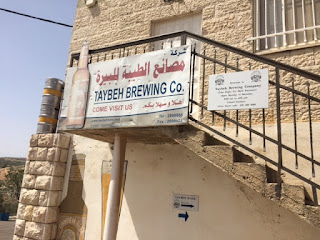This morning we left Nazareth and traveled through the West Bank and back to Jerusalem. This post is about food, politics, and religion - all of which are intertwined in the Bible and in the land of the Holy One.
Our day began with a 25 minute delay at the check point. Why? We don't know, and we couldn't ask. The soldiers didn't look in the mood to answer questions. We had gotten there about twenty minutes early to be in the front of the line, so basically we sat for forty-five minutes. And then our journey continued.
Jesus made this same journey - see, for example, Luke 17:11-19. Jesus is making his way to Jerusalem, along the border between Samaria and Galilee, when he heals ten lepers. Tradition says it was in Burqin - we stopped at the church there, where I took a picture of the icon you see to the right.There was one who turned back to say "thank you." And he was a Samaritan. The story is not only about the importance of gratitude, but also about how the "other" sometimes teaches us more about our own faith than our fellow "insiders" do. Jesus challenges his followers in a similar way when he makes the compassionate Samaritan the one who shows mercy in one of his parables.
 We continued along our way to St. Photini, the Greek Orthodox Monastery in Nablus, where Jacob's Well is found. We climbed down to drink from it. See John 4:1-30 if you don't know the story that we remembered there. Once again, Jesus encounters a Samaritan - this time a woman - and they engage in conversation that opens the door for reconciling old animosities.
We continued along our way to St. Photini, the Greek Orthodox Monastery in Nablus, where Jacob's Well is found. We climbed down to drink from it. See John 4:1-30 if you don't know the story that we remembered there. Once again, Jesus encounters a Samaritan - this time a woman - and they engage in conversation that opens the door for reconciling old animosities. So as we have been doing, we visited old churches - built upon centuries of memories. Christians are a very small minority in the Holy
So as we have been doing, we visited old churches - built upon centuries of memories. Christians are a very small minority in the HolyLand now - around 1.5%. But those who are here trace their ancestors back to the earliest
Christians. We come to these churches and they are in danger of becoming museums, but at the moment they are still alive with real Christians. Nablus, for example, is a city of about seven thousand - with just seventy or so Christians.
Nablus is famous for its kanafeh. I passed because of an allergy to pistachios sprinkled on top, but it looked pretty amazing and I have it on good authority from many of my fellow pilgrims that it was. Even though I didn't eat any of it, however, I made a new friend.
We came, then, to Taybeh, the only 100% Christian town in the Paletinian Authority. There we visited the ruins of the fourth century church of St. George. It is a beautiful spot used by three congregations: the Roman Catholic parish, the Melkite (Eastern Rite Catholic) parish, and the Greek Orthodox parish.
From there we headed to lunch, and then to a tour of the Taybeh Brewery. (I bet you didn't see THAT coming!) In fact this is the beer we have been drinking throughout our time here, both in Jerusalem and in Nazareth.
The family - at least the younger generation - were born in Boston. They young woman giving us the tour told us she lived in Boston until age ten, moved back to Palestine, went to college in Boston, and then came back home. Her brother and her cousin have done the same.
Ponder that for a moment. Anyone who knows me knows one reason, at least, that I enjoyed the brewery. But there is much more involved than my love for beer. This is about sacrifice, and hope, and economic development. And religious people should never minimize the last of those: otherwise we make people dependent on our
And that our prayers alone are not enough. I believe that when we take the long view we know in our bones that there is no peace without justice - and our destinies are intertwined: male and female, rich and poor, young and old, Christian and Jew and Muslim, first and second and third world. And yes, Israeli and Palestinian.
When Jesus encountered a Samaritan woman at the well and a Samaritan leper who said "thank you" and when he made a Samaritan the unlikely "hero" of a story where the priest and the Levite don't come off very well, he was (and is) challenging us to engage in this hard work of reconciliation.

I have a cookbook at home called Jerusalem: A Cookbook. The two authors were born in the same year, and both are from Jerusalem. But one of them is from East Jerusalem, where I am now writing this post (we're back at St. George's) and the other is from West Jerusalem. I highly recommend the cookbook, filled with beautiful pictures, great recipes, and much wisdom. They believe, as I do, that in the end shared hummus recipes will be the way that leads to peace on earth.
I would just add that beer and kanafeh also help.






No comments:
Post a Comment